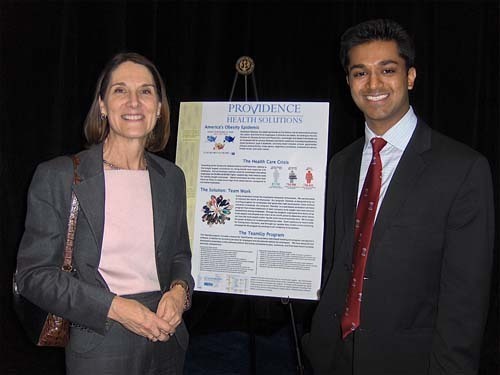
In 2005, Rajiv Kumar founded a company to market a team-based, employee-wellness program, based on a model and software platform he pioneered with his successful nonprofit Shape Up Rhode Island. Like any entrepreneur, Kumar has worked hard since trying to get private investors interested in his business, Providence Health Solutions LLC.
On Nov. 26, his new company received a major boost when it was among six businesses approved to receive the state’s new innovation tax credit, designed to help startup companies in high-wage industries secure private venture capital.
Kumar said the innovation tax will enable him to attract local angel investors who probably would not otherwise have invested in Providence Health Solutions.
“This tax credit changes the game entirely for our company,” said Kumar, a medical student at Brown University.
Five other companies were among the first group of startups to receive the tax credit: Bionica Corp., a Providence spin-off of the industrial design firm Design Lab that is developing a new personal communications system for the hearing-impaired; Tizra Inc., a Providence tech company marketing a Web interface that enables users to manipulate PDF files cheaply and quickly; Lincoln-based Lighthouse Security Group, a subsidiary of Lighthouse Computer Services that focuses on the IT security market; North Kingstown-based Ocean State Solutions LLC, a financial services firm seeking to market a mobile telephone payment system; and Public Display Inc., a Rhode Island-based software company focused on developing Web applications using new information-extraction technology.
The innovation tax credit was proposed by the R.I. Science and Technology Advisory Council (STAC) and created by Gov. Donald L. Carcieri and the R.I. General Assembly last year. The tax credit was designed to support entrepreneurs and bolster private investment in the state’s high-wage industries, said Saul Kaplan, executive director of the R.I. Economic Development Corporation, which oversees the program.
“We’re trying to create a high-wage economy here so all Rhode Islanders can access higher-wage jobs,” Kaplan said. “And to do that we need to increase our innovation capacity and create an environment where we can grow those sectors of our economy that have the potential to pay higher wages to Rhode Islanders. This credit is one important element of that strategy.”
The law, which expires in 2016, enables the EDC to award up to $2 million in tax credits every two years for companies that produce goods or services and had annual gross revenue of less than $1 million in the prior two calendar years. The credits may be carried forward for up to three years.
Participating companies can receive up to $100,000 in tax credits, which they can give away to investors as a one-time tax break on their individual state income taxes. Investors receive a tax credit for up to 50 percent of their capital investment in the company, so that an angel investor putting $200,000 into a company would receive the entire $100,000 tax break.
The credits can be shared by up to 10 people, but cannot be sold. In addition to being given away to investors, the tax credit can also be distributed among employees or used as a signing bonus to attract a new executive.
David Durand, president of Tizra, said he might use the $100,000 tax credit to recruit an experienced chief executive in the next year to guide the company’s growth. Like many entrepreneurs in the information technology sector, Durand said he and Tizra’s three other founders lack the experience of running a multimillion-dollar business. Before putting their money on the line, many angel investors want to see experience in a company’s leadership team.
“It should be really helpful in getting local investment,” said Durand, an adjunct assistant professor of computer science at Brown. “It’s a good carrot to offer potential investors.”
Kumar said the tax credit will be instrumental in his effort to raise $300,000 in private investment in Providence Health Solutions before late January, when he and his business partner, Brad Weinberg, plan to start marketing its wellness program to major companies across the country.
The wellness program challenges teams of participants to lose the greatest percentage of collective team weight, log the most hours of physical activity and walk the highest number of pedometer steps over several weeks. The teams are tracked and scored using a proprietary software system.
Kumar proved the effectiveness of the wellness program last year, when 744 teams across Rhode Island competed in Shape Up Rhode Island’s weight-loss and fitness challenge, losing a collective 28,519 pounds and logging 327,844 hours of exercise.
Since Providence Health Solutions won the student division of the 2007 Rhode Island Business Plan Competition, a handful of angel investors in the state who Kumar has been wooing have expressed interest in putting their money into his company. But they have been waiting to see whether the tax credits would be available, he said.
Having been awarded the innovation tax credit, Kumar is anticipating that those investors will jump on board, and he said he is working to hire an executive team in the next month, including a vice president of sales, an operations manager and a technical director.
“We have a number of investors who’ve said this tax credit would be the icing on the cake,” Kumar said. “We’re ramping up our staff and ramping up our offering, and this tax credit could not have come at a more fortuitous time.” •










